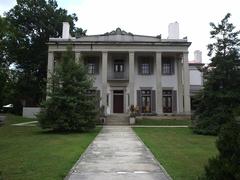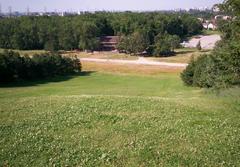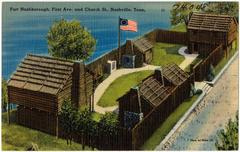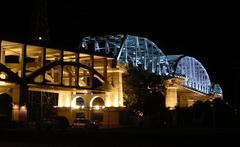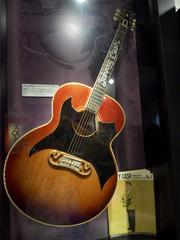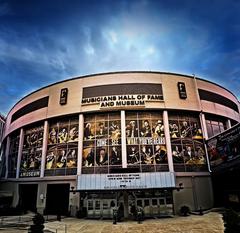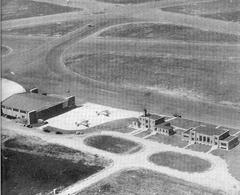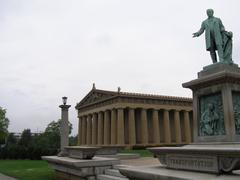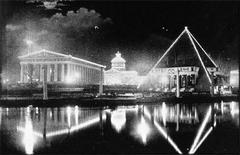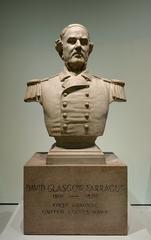
Confederate Memorial Hall, Vanderbilt University
Memorial Hall Visiting Hours, Tickets, and Nashville Historical Sites Guide
Date: 04/07/2025
Introduction to Memorial Hall at Vanderbilt University, Nashville
Memorial Hall at Vanderbilt University—formerly known as Confederate Memorial Hall—is a landmark deeply embedded in Nashville’s cultural and historical landscape. Nestled on the Peabody College campus, this collegiate Gothic and neoclassical building offers visitors a window into the American South’s evolving narratives about heritage, memory, and reconciliation. Built in 1935 with funding from the United Daughters of the Confederacy (UDC), the hall originally honored Confederate veterans and housed their female descendants pursuing education.
Over time, Memorial Hall transformed from a symbol of Confederate remembrance into a focal point for critical conversations around inclusion and historical responsibility. The removal of the “Confederate” inscription in 2016—following a legal settlement and university-wide dialogue—marked a significant chapter in Vanderbilt’s commitment to fostering a more inclusive campus. Today, Memorial Hall serves as both a student residence and a site for reflection, drawing visitors interested in the intersections of Southern history, education, and social progress.
For the latest visitor information, including hours and accessibility, consult Vanderbilt’s official resources (Vanderbilt University Campus Tours, Fox17 News).
Table of Contents
- Historical Overview of Memorial Hall
- Visiting Memorial Hall: Hours and Admission
- Accessibility
- Travel Tips and Nearby Attractions
- Photographic Opportunities and Visual Highlights
- Frequently Asked Questions (FAQ)
- The Renaming Controversy and Resolution
- United Daughters of the Confederacy’s Role
- Cultural Sensitivities and Community Perspectives
- Legal and Institutional Challenges
- Broader Context: Confederate Symbols in Higher Education
- Enhancing Your Visit: Recommendations
- Plan Your Visit and Stay Connected
Historical Overview of Memorial Hall
Memorial Hall traces its origins to the early 1930s, when the UDC contributed $50,000 to George Peabody College for Teachers (later merged with Vanderbilt University). The donation came with stipulations: the building would be named “Confederate Memorial Hall” and provide rent-free housing for the descendants of Confederate soldiers, reflecting the UDC’s mission to shape public memory.
Completed in 1935, the building’s architectural style combines collegiate Gothic and neoclassical elements. After Peabody College was acquired by Vanderbilt University in 1979, Memorial Hall became part of the broader campus community. Over ensuing decades, its Confederate association sparked campus-wide and national debates, culminating in the removal of the “Confederate” inscription in 2016 (Fox17 News).
Visiting Memorial Hall: Hours and Admission
Visiting Hours:
Memorial Hall is accessible to the public during Vanderbilt’s regular campus hours, typically 8:00 AM to 6:00 PM, Monday through Friday. Access is more limited during weekends, holidays, and university events. Always check the latest updates on the Vanderbilt University Campus Tours page.
Admission:
No admission fee is required to visit Memorial Hall or view its exterior. Guided campus tours, which often include Memorial Hall, may require advance registration.
Guided Tours:
Vanderbilt offers guided campus tours that provide historical context and highlight Memorial Hall’s story within the university’s broader evolution. For tour availability and booking, visit the Vanderbilt Admissions Visit page.
Accessibility
Memorial Hall and the surrounding campus are ADA-compliant, featuring ramps, elevators, and accessible restrooms. Visitors needing additional accommodations can contact Vanderbilt’s Office of Equity, Diversity, and Inclusion before their visit for personalized assistance.
Travel Tips and Nearby Attractions
Getting There:
Memorial Hall is located at 2305 West End Avenue, Nashville, TN, on the Peabody College campus. The site is accessible by public transit, rideshare, or car. Visitor parking is limited; be sure to review Vanderbilt’s parking guidelines before arrival.
Nearby Attractions:
Expand your Nashville history experience by visiting additional campus landmarks such as Kirkland Hall and the Fine Arts Gallery. Off-campus, consider the Parthenon and Centennial Park, the Tennessee State Museum, or the Belmont Mansion (Travel Lemming).
Photographic Opportunities and Visual Highlights
Memorial Hall’s striking facade—decorated with stone carvings and historic plaques—offers excellent photographic subjects, especially in the early morning or afternoon light.
Suggested image alt text: “Exterior view of Memorial Hall at Vanderbilt University, highlighting collegiate Gothic architecture and historic details.”
While photography is encouraged for personal use, visitors should respect the privacy of residents and campus policies.
Frequently Asked Questions (FAQ)
Q: Is Memorial Hall open to the public?
A: Yes. The building’s exterior and nearby grounds are accessible during campus hours. Interior access is generally restricted as the building is a student residence.
Q: Are tickets required?
A: No. There are no admission fees or tickets required for visiting Memorial Hall’s exterior. Guided tours may require advance sign-up.
Q: Can I visit Memorial Hall on weekends?
A: Access is generally more limited on weekends. Confirm availability on the Vanderbilt University Campus Tours page.
Q: Is Memorial Hall accessible for visitors with disabilities?
A: Yes. The building and surrounding campus feature ADA-compliant facilities.
Q: Are special events held at Memorial Hall?
A: The hall is used primarily as a residence, but Vanderbilt occasionally hosts campus events and annual conferences on race and reconciliation.
The Renaming Controversy and Resolution
The building’s original name, “Confederate Memorial Hall,” was established in accordance with the UDC’s 1930s donation agreement. As conversations about Confederate symbolism intensified in the late 20th and early 21st centuries, Vanderbilt sought to change the name to reflect a more inclusive environment.
Legal action by the UDC led to a court ruling: the university could only remove the “Confederate” name if it repaid the donation’s present value. In 2016, thanks to a $1.2 million anonymous donation, Vanderbilt reimbursed the UDC and officially removed the inscription from the building’s facade (Fox17 News).
United Daughters of the Confederacy’s Role
The UDC has played a significant part in shaping memory of the Confederacy across the South through monuments, memorials, and buildings like Memorial Hall. While some regard the organization as preserving history, others critique its role in promoting a revisionist narrative that downplays the realities of slavery and the Confederacy’s legacy.
Cultural Sensitivities and Community Perspectives
The renaming of Memorial Hall reflects shifting societal values and the university’s ongoing efforts to balance heritage preservation with inclusivity. The process underscored both the complexities of donor intent and the university’s responsibility to foster a welcoming environment for all students.
Campus and community reactions were mixed: many welcomed the change as overdue, while some alumni and heritage groups saw it as an erasure of Southern history.
Legal and Institutional Challenges
Vanderbilt’s efforts to remove the “Confederate” name involved navigating legal stipulations set by the original donation. The final resolution required both financial restitution and careful university leadership, illustrating the broader challenges institutions face when reevaluating historical symbols (Fox17 News).
Broader Context: Confederate Symbols in Higher Education
Vanderbilt’s Memorial Hall is among several campus sites nationwide reexamining Confederate symbols. Similar efforts include Middle Tennessee State University’s renaming of buildings and the removal or reinterpretation of monuments at other institutions. These actions reflect ongoing national dialogues on race, memory, and institutional responsibility (Smithsonian Magazine).
Enhancing Your Visit: Recommendations
- Prepare Ahead: Learn about Confederate memorialization and the “Lost Cause” narrative before your visit. Vanderbilt’s archives and reputable historical sources offer valuable context.
- Join Campus Events: Vanderbilt often hosts public lectures, conferences, and panel discussions on race, history, and reconciliation.
- Respect the Space: Memorial Hall is an active residence and administrative building. Be considerate of students and staff during your visit.
- Expand Your Journey: Explore nearby historical attractions in Nashville for a richer understanding of the region’s history (Travel Lemming).
Plan Your Visit and Stay Connected
For the most current information on hours, tours, and accessibility, consult Vanderbilt University’s official visitor services or campus tours website. To deepen your experience, download the Audiala app for guided audio tours, and follow Vanderbilt and local tourism channels for updates on special events and exhibitions.
Memorial Hall stands as a testament to the ways communities can confront difficult histories, fostering dialogue and progress toward greater inclusion. Your visit provides a chance to reflect on the complexities of memory and the enduring impact of historical narratives.
Summary of Key Points and Recommendations
Visiting Memorial Hall at Vanderbilt University offers a compelling lens through which to explore the intersections of history, memory, and social change. Once a monument to Southern heritage, the hall’s transformation reflects broader national debates about Confederate symbols and the ongoing work of institutional reconciliation. The site’s accessibility, educational resources, and proximity to other Nashville attractions make it an essential stop for history enthusiasts, students, and travelers.
To maximize your visit:
- Check current visiting hours and accessibility accommodations on Vanderbilt’s website.
- Consider joining a guided campus tour for historical context.
- Explore nearby landmarks such as the Parthenon and Centennial Park for a broader view of Nashville’s heritage.
- Use digital resources like the Audiala app for self-guided tours and deeper historical insights.
Memorial Hall remains an important educational and cultural site, inviting all visitors to engage thoughtfully with the past and its implications for the present (Vanderbilt University Official Website, Visit Music City, Fox17 News).
Sources and Official Links
- Vanderbilt University Campus Tours
- Vanderbilt University Official Website
- Fox17 News on Memorial Hall
- Travel Lemming - Nashville Tips
- Smithsonian Magazine - Confederate Monuments
- Visit Music City




